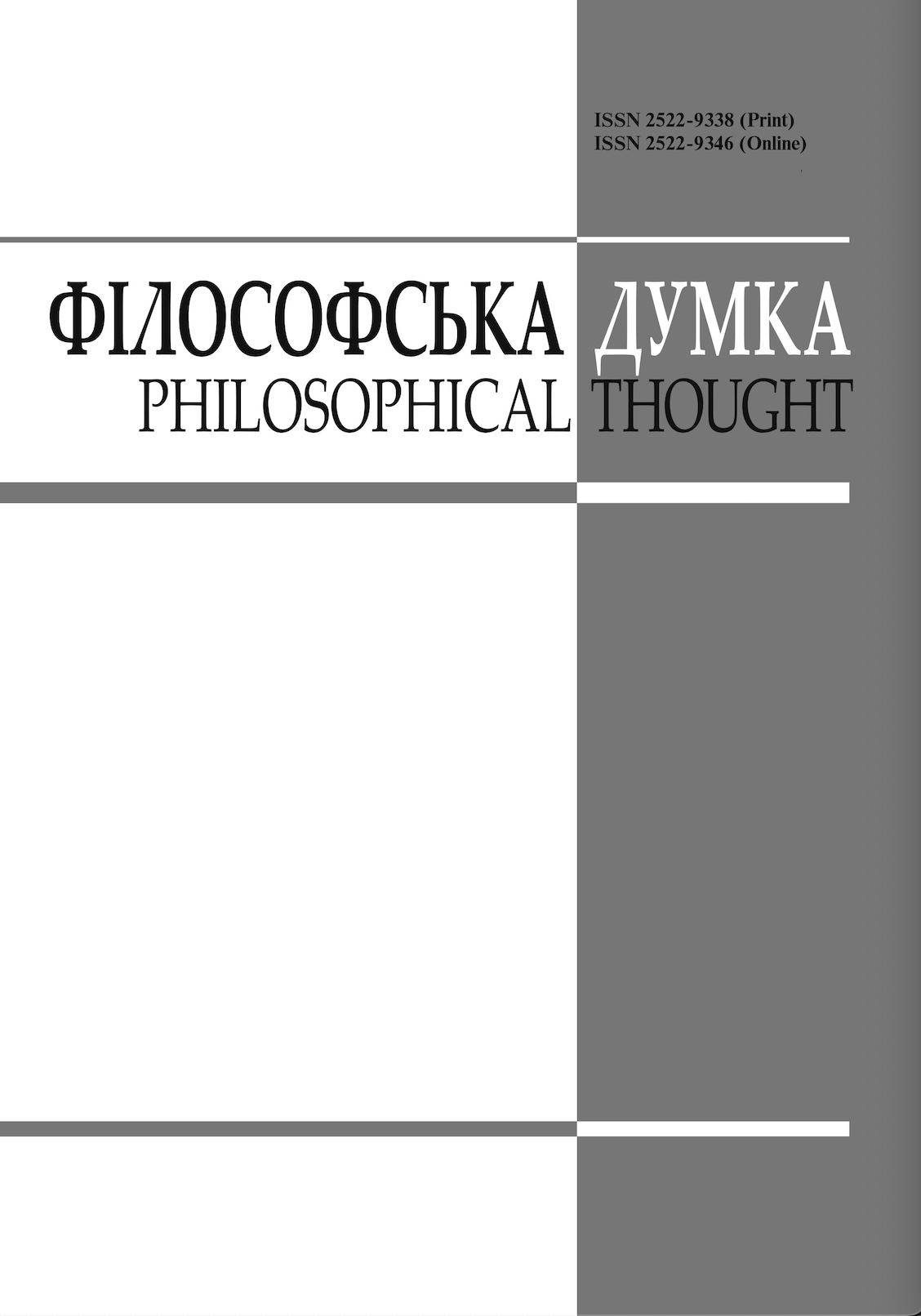SOME REMARKS ON PHENOMENOLOGY OF MUSIC
YOUNG SCIENTIST'S PAGE
DOI:
https://doi.org/10.15407/fd2025.03.223Keywords:
music, culture, conceptual deficit, phenomenology, ontologyAbstract
The paper shows the necessity to investigate the phenomenology of music, which the author understands as a propaedeutic to the construction of an ontology of music as a specific cultural phenomenon. One cannot proceed towards the task relying solely on experiential descriptions of what music is perceived to be and on excessively metaphoric language commonly in use with music studies. Unlike the natural science, which starts inductively from experience to dive afterwards into a sort of theory backed by rigorous experimentation, understanding cultural phenomena has to begin not with empirical impressions, but with a grounded concept. Otherwise, one risks finding oneself in quest for some other unintended entity. These grounded concepts are still wanted in the field of musical culture studies. Therefore, the notion of conceptual deficit is introduced, denoting the state of affairs in the attempts of philosophy and cultural studies to investigate music. The author analyses the existing approaches to musical phenomenology in the context of philosophy of music, which, unlike the correct phenomenological investigation of music, is rather a set of implications that inevitably arise when traditional and commonplace ideas about music are accepted as the basis for phenomenological research. Some of difficult-to-resolve contradictions to which the tradition of descriptive musical phenomenology comes when attempting to construct ontological models are examined. In the author's opinion this state of affairs contradicts Husserl's guidance «zurück zu den Sachen selbst», which suggests it is necessary to turn away from naïve impressions of some thing to the very thing as it is, towards «to ti ên einai», «the what it was supposed to be», that is, to the solid concept and not a partial example of the thing. The article charts a path of transition from the phenomenological study of music to a genuine investigation of the paradoxes and problems of the ontology of music as a specific cultural phenomenon.
Music as the very thing appears to have to be conceptualised not as an acoustic phenomenon, not as an immediate emotional experience, not as a sentence with obscure and fluid meaning from a language purportedly capable to express the inexpressible, but as a radically different thing, an entity that exists as an enigma, a problem to be talked about and to be solved, perhaps analytically, to ensure the sound ontology of music as a cultural phenomenon.
References
Benson, B.E. (2011). Phenomenology of Music. In: T. Gracyk, A. Kania (Eds.), The Routledge Companion to Philosophy and Music. Taylor & Francis e-Library.
Christensen, E. (2000). Music Precedes Language. Nordic Journal of Music Therapy, 9:2, 32-35. Routledge.
https://doi.org/10.1080/08098130009477999
Einstein, A. (2018). The Collective Papers of Gesammelte Schriften. Vol.15 (Ed. by K. Buchwald, D. Illy, J. ...(???) et.al.). Prinston: Prinston University Press.
Gracyk, T., Kania, A. (Eds.). (2011). The Routledge Companion to Philosophy and Music. Taylor & Francis e-Library.
https://doi.org/10.4324/9780203830376
Hindemith, P. (1952). A Composer's world: Horizons and Limitations. Cambrige: Harvard University press.
Husserl, E. (1912). Einleitung in die Phänomenologie. Vorlesungen aus dem Sommer, B II 19/8a. Retrieved from: https://hiw.kuleuven.be/digitalhusserl/items/show/1605
Ingarden, R. (1989). Ontology of the Work of Art: The Musical Work, The Picture, The Architectural Work, The Film. Athens: Ohio University Press.
Kania, A. (2011). Definition. In: T. Gracyk, A. Kania (Eds.), The Routledge Companion to Philosophy and Music. Taylor & Francis e-Library.
Kant, I. (1919). Samtliche Werke. Bd 1. Kritik der reiner Vernunft. Leipzig: Verlag von Felix Meiner.
https://doi.org/10.1515/9783112332047
Lundbom, J.R. (1978). God's Use of the Idem per Idem to Terminate Debate. The Harvard Theological Review, 71(3/4). Cambridge University Press.
https://doi.org/10.1017/S0017816000026080
Matheson, Carl and Caplan, Ben. (2011). Ontology. In: T. Gracyk, A, Kania (Eds.), The Routledge Companion to Philosophy and Music. Taylor & Francis e-Library.
Raimond, Y. еt al. (2007). The Music Ontology. In: Proceedings of the 8th International Conference on Music Information Retrieval (ISMIR 2007) (pp. 417-422). Vienna: ISMIR.
Welten, R. (2009). What do we hear when we hear music? A radical phenomenology of music. Studia Phaenomenologica, 9(January), 269-286. Bucharest; Romanian Society for Phenomenology & Humanitas.
Downloads
-
PDF (Українська)
Downloads: 15
Published
How to Cite
Issue
Section
License
Authors who publish with this journal agree to the following terms:
- Authors retain copyright and grant the journal right of first publication.
- Authors are able to enter into separate, additional contractual arrangements for the non-exclusive distribution of the journal's published version of the work (e.g., post it to an institutional repository or publish it in a book), with an acknowledgement of its initial publication in this journal.
- Authors are permitted and encouraged to post their work online (e.g., in institutional repositories or on their website) prior to and during the submission process, as it can lead to productive exchanges, as well as earlier and greater citation of published work (See The Effect of Open Access).


